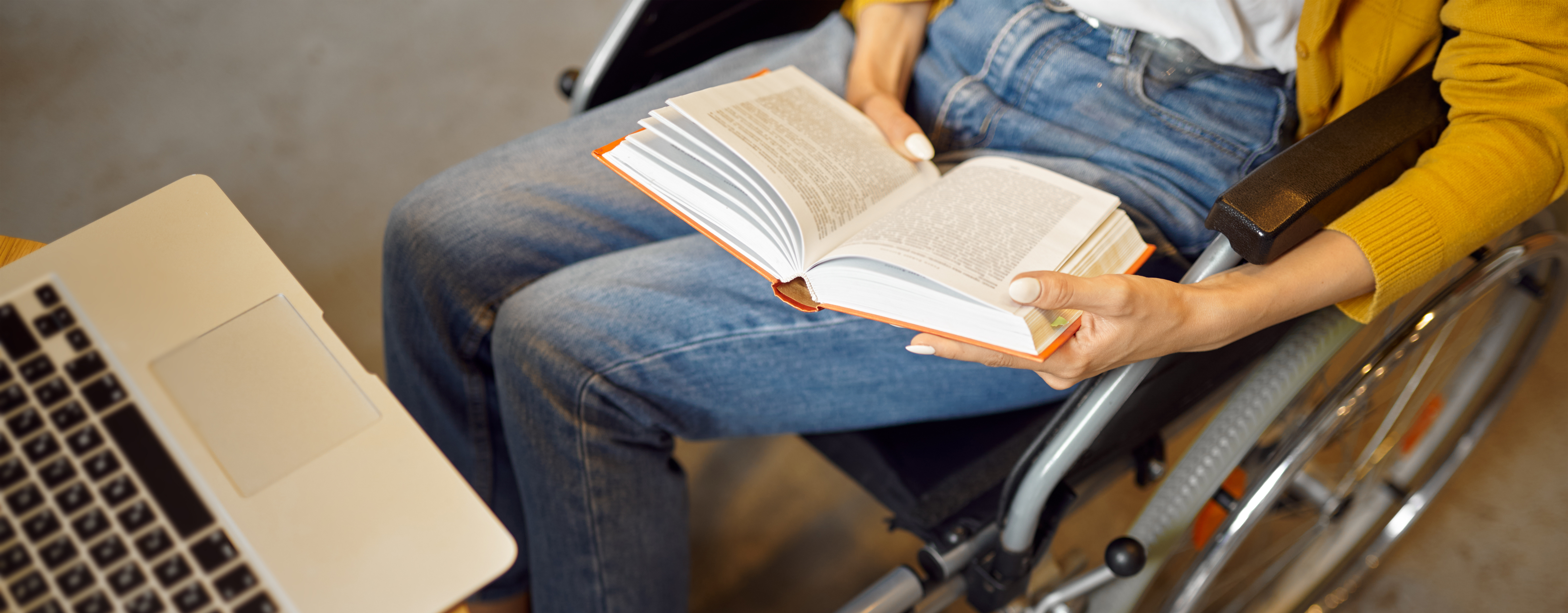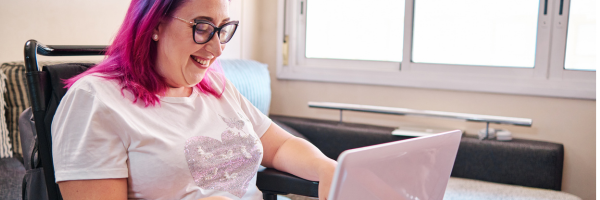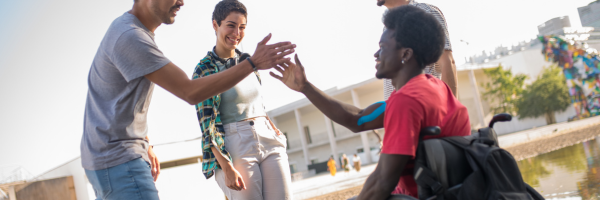Sandburg wants to ensure the college is a place where students of all backgrounds can pursue your academic and professional goals. Our Galesburg and Carthage campuses and Annex location were designed with physical accessibility in mind; so anyone who's wheelchair-bound or who has impaired mobility can move from one end of campus to the other with limited or no assistance. Our accessible design features include:
- Reserved parking near building entrances
- Curb cuts for wheelchair users
- Push-button door openers for those who have difficulty opening doors
- Ramp paths and elevators as alternatives to stairs
- Braille room identifiers on all classroom and office door placards
- Accessible software and technology via the assistive technology lab and the library (Galesburg campus)
How are accommodations put in place?
The student, coordinator of academic support and individual instructors work together to ensure accommodations are put in place properly. Learn more about accommodations.What if I've felt discrimination because of my disability?
The first step is to try to resolve your complaint with the person most directly involved. See the next steps in the process.
COMPLIANCE
In compliance with the Rehabilitation Act of 1973 and the Americans with Disabilities Act of 1990, disability support at Sandburg helps make the classroom equally accessible to students with disabilities by providing you with tools and accommodations to remove barriers imposed by your unique challenges.
If you have questions about disability access to campus resources or want to request accommodations for a disability while on campus can contact the coordinator of academic support services. If you're taking online classes or attending the Carthage campus, follow the same process.
NON-DISCRIMINATION
View our non-discrimination policy.
Accommodations are available to all students, whether you attend the Galesburg campus, the Carthage campus, the Annex, online or as dual-credit students. If you attend the Carthage campus, online or are dual credit, view the section on accommodating distance students in the Information for new and prospective students section below. If you're concerned you may have been discriminated against on the basis of disability, refer to the section on our grievance procedure in the Student rights to accommodation section below.
ACCOMMODATIONS FOR STUDENTS, GUESTS & SPECIAL EVENTS
If you'd like to request disability accommodations for a visit to campus — be it a meeting or event — complete the request for non-academic accommodations at least five business days prior to the event. Some accommodations, such as requests for a sign language interpreter, may take longer to fulfill, and should be requested as far in advance as possible.
This form doesn't take the place of a letter of accommodation (LOA) for a current student's academic accommodations, and LOAs don't necessarily ensure accommodation services at college events and appointments.
If you need help completing this form, require an alternate version of this form, or have questions or concerns about the use of this form or the college's accommodation procedures, email the coordinator of academic support services at 309.341.5262 (TTY: 309.341.5400).
Academic support office
The academic support office (A34, Student Center, Galesburg) coordinates accommodations for students who encounter accessibility barriers in the classroom. Accommodations can be made for a variety of disabilities, from ADHD and intellectual disabilities to wheelchair-accessible desks in classrooms.
If you're in Carthage or are enrolled in dual-credit courses, contact academic support in Galesburg to arrange for accommodations by calling 309.341.5262. If you're taking online classes, learn how Sandburg accommodates distance students.
WEBSITE ACCESSIBILITY
Sandburg strives to make our website accessible to people with disabilities, including those with vision and hearing impairments. If you encounter any accessibility barriers while using this site, report them to the coordinator of academic support services, and we'll try to get you the information you need in an accessible format.
We also want to have a fully accessible online environment for our students, whether you're taking only online classes, online components or face-to-face classes, which includes:
- Using Moodle, an accessible LMS software, as Sandburg's official LMS
- Ensuring course software vendors certify the software's accessibility for screen readers, magnifiers and other assistive technology
- Consistently checking and improving the website to align with W3C accessibility standards
- Working toward ensuring all audiovisual content provided online is alternatively captioned or transcribed
- Providing accommodations through Academic Support Services on request for situations where materials aren't already accessible, or where accommodations are needed to alter content for students in need
Assistive technology lab
If you need assistive technologies or are receiving testing accommodations, visit the assistive technology lab, room B68, Galesburg campus. The lab is a private testing center, and offers:
- Adjustable-height work desks to accommodate students in wheelchairs
- Stationary document magnifier
- Computers with various assistive software installed:
- Software-based document magnifiers
- Screen magnifier and
contrasting - Voice-to-text software
- Screen-reading software
- Visual math and drawing aids for blind students
- Voice recorders for loan
What are my rights regarding accommodating my disability?
Students with disabilities have the right to equal education access as non-disabled students. If a disability imposes a barrier to equal access to the physical or learning environment, Sandburg is responsible for providing accommodations, including:
- Alterations to the physical environment (e.g., push-to-open doors, open walkways, ramps, elevators, etc.)
- Alterations to classroom layout (presence of adjustable desks, desk rearrangement, etc.)
- Presentation considerations, such as providing handout supplements to presentations
- Testing support, including providing a reader, testing in an alternate location and extended testing time
- Permission to use tools and services in the classroom (e.g., voice recorders, guide dogs, ASL interpreters, etc.)
- Technological accommodations such as screen readers and voice-to-text applications
You have the right to request that anything can be considered as an accommodation for any disability, including intellectual disabilities, anxiety, PTSD and attention deficits. Accommodations aren’t pre-defined or selected as if ordering from a menu; they're tailored to each individual’s unique circumstances. The academic support services coordinator determines what accommodations are appropriate in a given circumstance.
Are there accommodation limitations?
A student has the right to request anything as an accommodation. It'll then be determined whether the request is disability-related and “reasonable.” If it is, it should be granted.
An accommodation is disability-related if it can be proven the accommodation will serve to lessen the negative effects of a disability. Accommodation requests that don't address the barriers imposed by a student's disability can't be granted.
An accommodation is reasonable under the following conditions:
- It's not a fundamental alteration to the course objectives (e.g., extended time on tests may be an appropriate accommodation in most cases, but it fundamentally alters a triage simulation).
- It's not of a personal nature.
- It's not a direct threat to others.
How are student disability records handled?
Disability records often include medical evaluations and reports, high school IEPs and other private documents, and are stored on a restricted network drive, which is accessible only to the coordinator of academic support and the dean of student success. No other college employee has access to the drive. Physical copies of disability documentation are kept only long enough to be scanned and uploaded to the restricted drive; the original copies are then either returned to the student or destroyed. All records kept are electronic.
No records are shared with any other students, staff or faculty at the college, or the student's family or friends per FERPA and HIPAA guidelines, without the student's permission. A student's signature on a letter of accommodation (LOA) gives permission for Sandburg to arrange accommodations, not permission for disability records to be shared.
How are accommodations put in place?
The student, coordinator of academic support and individual instructors work together to ensure accommodations are put in place properly. If that doesn't work, contact the coordinator of academic support services or, if the coordinator of academic support services is the alleged source of the discrimination, the dean of student success.
If those steps don't results in a satisfactory conclusion, submit, in writing and within 10 school days of the issue in question, a formal complaint to the immediate supervisor against whom your complaint is directed. (See Procedure on framework for addressing concerns number 3.18.0.1). All complaints are reviewed by the appropriate administration, who determines the college's response. All decisions, notifications of decisions and reasons for decisions are presented in writing.
You can simultaneously file a complaint with the Office of Civil Rights, the U.S. Department of Education or both.


